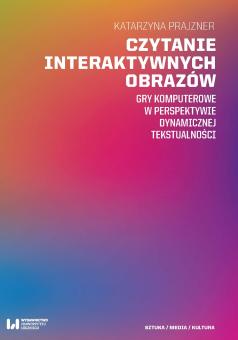-
2368
-
1499
-
1352
-
1201
-
1052
Czytanie interaktywnych obrazów
Gry komputerowe w perspektywie dynamicznej tekstualności

Pliki do pobrania
Gry komputerowe są obecnie jednymi z najgwałtowniej i najciekawiej rozwijających się mediów. Książka łączy w sobie perspektywy badawcze teorii gier, filmu i literatury, groznawstwa aby dyskutować o tym, czym gry komputerowe są, w jaki sposób tworzą się relacje między nimi a graczami, a przede wszystkim jak funkcjonują one jak teksty i tworzą znaczenia. Są w niej również zaproponowane narzędzia analityczne dotyczące zarówno ich warstwy tekstowej, jak i procesu recepcji, ukazując w jaki sposób na styku tych strategii badawczych rodzi się bardziej zrozumiały obraz grywalnych tekstów oraz kultur, które się wokół nich tworzą. Jednym z problemów poruszanych w książce jest kwestia przestrzennych własności gier, które mogą ewokować opowiadania ze względu na angażujące oraz interpretacyjne procesy, którym podlega gracz oraz że możliwym jest postrzeganie środowiska gry nie tylko jako wizualnego spektaklu, ale lokacji, która generuje znaczenie. W książce pojawia się także zagadnienie tworzenia medialnych reprezentacji światów, które generują opowiadania oraz dostarczają różnorodnych sposobów ich doświadczania, będąc głosem w dyskusji wokół problematyki związanej ze świadomą medialnie narratologią.
Aarseth E., Aporia and Epiphany in Doom and The Speaking Clock. The Temporality of Ergodic Art, [w:] Cyberspace Textuality. Computer Technology and Literary Theory, M.-L. Ryan (red.), Indiana University Press, Bloomington–Indianapolis 1999.
Aarseth E., Cybertekst. Spojrzenia na literaturę ergodyczną, przeł. D. Sikora, M. Pisarski, P. Schreiber, M. Tabaczyński, Korporacja Ha!art – Miejskie Centrum Kultury w Bydgoszczy, Kraków–Bydgoszcz 2014.
Aarseth E., Genre Trouble. Narrativism and the Art of Simulation, [w:] First Person. New Media as Story, Performance, and Game, N. Wardrip-Fruin, P. Harrigan (red.), The MIT Press, London 2004.
Aarseth E., Ludology, [w:] The Routledge Companion to Video Game Studies, M.J.P. Wolf, B. Perron (red.), New York 2014.
Aarseth E., Quest Games as Post‑Narrative Discourse, [w:] Narrative across the Media. The Languages of Storytelling, M.-L. Ryan (red.), University of Nebrasca Press, Lincoln–London 2004.
Aarseth E.J., Cybertext. Perspectives on Ergodic Literature, Johns Hopkins University Press, Baltimore–London 1997.
Andersen P., A Theory of Computer Semiotics. Semiotic Approaches to Construction and Assessment of Computer Systems, Cambridge University Press, Cambridge 1991.
Aukstakalnis S., Blatner D., Silicon Mirage. The Art and Science of Virtual Reality, Peach Pit Press, Berkeley 1992.
Bachtin M., Problemy poetyki Dostojewskiego, przeł. N. Modzelewska, Państwowy Instytut Wydawniczy, Warszawa 1970.
Barthes R., S/Z, przeł. M.P. Markowski, M. Gołębiewska, Wydawnictwo KR, Warszawa 1999.
Bloom H., Lęk przed wpływem, przeł. M. Szuster, A. Bielik-Robson, Towarzystwo Autorów i Wydawców Prac Naukowych „Universitas”, Kraków 2002.
Bogost I., Persuasive Games The Expressive Power of Videogames, The MIT Press Cambridge, Massachusetts–London 2007.
Bogost I., Unit Operations. An Approach to Videogame Criticism, The MIT Press, Cambridge 2006.
Bolter J.D., Człowiek Turinga. Kultura Zachodu w wieku komputera, przeł. T. Goban-Klas, Państwowy Instytut Wydawniczy, Warszawa 1990.
Bolter J.D., Grusin R., Remediation. Understanding New Media, MIT Press, Cambridge, Massachusetts 2002.
Booth W.C., Rodzaje Narracji, [w:] Narratologia, M. Głowiński (red.), Słowo/obraz Terytoria, Gdańsk 2004.
Buckingham D., Studying Computer Games, [w:] D. Carr, D. Buckingham, A. Burn, G. Scott, Computer Games. Text, Narrative and Play, Polity Press, Cambridge 2006.
Caillois R., Gry i ludzie, przeł. A. Tatarkiewicz, M. Żurowska, Oficyna Wydawnicza Volumen, Warszawa 1997.
Chatman S., Coming to Terms. The Rhetoric of Narrative in Fiction and Film, Cornell University Press, London 1990.
Chatman S., Struktura tekstu, przeł. A. Elbanowski, „Literatura na Świecie” 1984, nr 4.
Comparative Textual Media. Transforming the Humanities in the Postprint Era, N.K. Hayles, J. Pressman (red.), University of Minnesota Press, Minneapolis 2013.
Cornwell R., Interactivity. Here to Stay, „New Observation” 1989, No. 71.
Csíkszentmihályi M., Does Being Human Matter – On Some Interpretive Problems of Comparative Ludology, „Behavioral and Brain Sciences” 1982, Vol. 5, No. 1.
Eco U., Dzieło otwarte, przeł. J. Gałuszka, Czytelnik, Warszawa 1973.
Eco U., Lector in fabula. Współdziałanie w interpretacji tekstów narracyjnych, przeł. P. Salwa, Państwowy Instytut Wydawniczy, Warszawa 1994.
Eco U., Rorty R., Brooke-Rose J.Ch., Interpretacja i nadinterpretacja, S. Collini (red.), przeł. T. Bieroń, Kraków 1996.
Elliott A.B.R., Kapell M.W., Introduction. To Build a Past That Will „Stand the Test of Time” – Discovering Historical Facts, Assembling Historical Narratives, [w:] Playing with the Past, A.B.R. Elliott, M.W. Kapell (red.), Bloomsbury, London 2013.
Eskelinen M., Towards Computer Game Studies, [w:] First Person. New Media as Story, Performance, and Game, N. Wardrip-Fruin, P. Harrigan (red.), The MIT Press, London 2004.
Federman R., Surfikcja – cztery propozycje w formie wstępu, [w:] Nowa proza amerykańska, wybrał, oprac. i wstępem opatrzył Z. Lewicki, przeł. J. Anders, Czytelnik, Warszawa 1983.
Film and Television after 9/11, W.W. Dixon (red.), Southern Illinois University Press, Illinois 2004.
Foresta D., Mergier A., Serexhe B., Ewolucja interfejsu. Między sztuką a technologią, przeł. O. i W. Kubińscy, „Magazyn Sztuki” 1997, nr 13/14.
Foucault M., Archeologia wiedzy, przeł. A. Siemek, Państwowy Instytut Wydawniczy, Warszawa 1977.
Frasca G., Ludolodzy też kochają opowiadania – notatki na temat sporu, który nigdy nie miał miejsca, przeł. M. Filiciak, [w:] Światy z pikseli. Antologia studiów nad grami komputerowymi, oprac. M. Filiciak, Wydawnictwo SWPS Academica, Warszawa 2010.
Frasca G., Ludology Meets Narratology. Similitude and Differences between (Video)Games and Narrative, „Parnasso” 1999, No. 3.
Frasca G., Simulation versus Narrative. Introduction to Ludology, [w:] The Video Theory Reader, M.J.P. Wolf, B. Perron (red.), Routledge, London–New York 2003.
Goban-Klas T., Media i komunikowanie masowe. Teorie i analizy prasy, radia telewizji i Internetu, Wydawnictwo Naukowe PWN, Warszawa–Kraków 1999.
Hall S., Kodowanie i dekodowanie, przeł. W. Lipnik, I. Siwiński, „Przekazy i Opinie” 1987, nr 1–2.
Hayles N.K., How We Became Posthuman. Visual Bodies in Cybernetics, Literature and Informatics, The University of Chicago Press, Chicago 1999.
Helman A., Psychoanalityczna teoria filmu, [w:] A. Helman, J. Ostaszewski, Historia myśli filmowej, Słowo/obraz Terytoria, Gdańsk 2007.
Huhtamo E., From Cybernation to Interaction. A Contribution to on Archeology of Interactivity, [w:] The Digital Dialectic, P. Lunenfield (red.), The MIT Press, London 1999.
Jenkins H., Kultura konwergencji. Zderzenie starych i nowych mediów, przeł. M. Bernatowicz, M. Filiciak, Wydawnictwa Akademickie i Profesjonalne, Warszawa 2007.
Johnson S., Everything Bad Is Good For You. How Today’s Popular Culture Is Actually Making Us Smarter, The Berkley Publishing Group, New York 2006.
Jokilehto J., Definition of Cultural Heritage. References to Documents in History, ICCROM Working Group ‘Heritage and Society, 2005.
Juul J., Gra, gracz, świat. W poszukiwaniu sedna „growości”, przeł. M. Filiciak, [w:] Światy z pikseli. Antologia studiów nad grami komputerowymi, oprac. M. Filiciak, Wydawnictwo SWPS Academica, Warszawa 2010.
Juul J., Half‑Real. Video Games between Real Rules and Fictional Worlds, The MIT Press, Cambridge 2005.
Juul J., Introduction to Game Time, [w:] First Person. New Media as Story, Performance, and Game, N. Wardrip-Fruin, P. Harrigan (red.), The MIT Press, London 2004.
Juul J., On Absent Carrot Sticks. The Level of Abstraction in Video Games, [w:] Storyworlds across Media, M.-L. Ryan, J.-N. Thon (red.), University of Nebraska Press, London–Lincoln 2014.
Kiełdanowicz M., Interakcjonizm w komunikologii – dramaturgiczna koncepcja życia społecznego E. Goffmana, [w:] Nauka o komunikowaniu. Podstawowe orientacje teoretyczne, B. Dobek-Ostrowska (red.), Wydawnictwo Uniwersytetu Wrocławskiego, Wrocław 2001.
Klevjer R., In Defense of Cutscenes, [w:] Proceedings of Computer Games and Digital Cultures Conference, F. Mäyrä (red.), Tampere University Press, Tampere 2002.
Landow G.P., Hypertekst. The Convergence of Contemporary Critical Theory and Technology, The Johns Hopkins University Press, Baltimore 1992.
Laurel B., Computers as Theatre, Addison-Wesley, Reading, Massachusetts 1991.
Manovich L., Język nowych mediów, przeł. P. Cypryański, Wydawnictwa Akademickie i Profesjonalne, Warszawa 2006.
Mäyrä F., An Introduction to Game Studies. Games in Culture, SAGE Publications, London 2008.
Michalik G., Być w mówieniu i być mówionym – o teorii języka Jacques’a Lacana i jej konsekwencjach dla podmiotowości, „Przestrzenie Teorii” 2010, nr 33.
Mitosek Z., Teorie badań literackich, Wydawnictwo Naukowe PWN, Warszawa 1998.
Murray J., Hamlet on the Holodeck, The MIT Press, Cambridge, Massachusetts 1997.
Nitsche M., Image, Play, and Structure In 3D Game Worlds, The MIT Press, Cambridge, Massachusetts–London 2008.
Parlett D., Oxford History of Board Games, Oxford University Press, Oxford 2006.
Pearce C., Story as Play Space. Narrative in Games, [w:] Game On. The History and Culture of Video Games, L. King (red.), Laurence King Publishing, London 2002.
Petrowicz M., Ludo‑narratywizm, czyli proceduralizm Bogosta na tle sporu ludologii z narratologią, „Replay. The Polish Journal of Game Studies” 2014, Vol. 1.
Poole S., Trigger Happy. The Inner Life of Videogames, Fourth Estate, London 2000.
Prajzner K., Tekst jako świat i gra. Modele narracyjności w kulturze współczesnej, Wydawnictwo Uniwersytetu Łódzkiego, Łódź 2009.
Riggan W., Pícaros, Madmen, Naīfs, and Clowns. The Unreliable First‑person Narrator, University of Oklahoma Press, Oklahoma 1981.
Rosen D., Expanding Interactive Media, „New Observation” 1989, No. 71.
Ryan M.-L., Avatars of Story, „Electronic Mediations Series” 2006, Vol. 17.
Ryan M.-L., Story/Worlds/Media. Tuning the Instruments of a Media‑Conscious Narratology, [w:] Storyworlds across Media, M.-L. Ryan, J.-N. Thon (red.), University of Nebraska Press, London–Lincoln 2014.
Shaw A., What Is Video Game Culture? Cultural Studies and Game Studies, „Games and Culture” 2010, Vol. 5, No. 4.
Sitarski P., Rozmowa z cyfrowym cieniem. Model komunikacyjny rzeczywistości wirtualnej, Rabid, Kraków 2002.
Sterczewski P., Czytanie gry. O proceduralnej retoryce jako metodzie analizy ideologicznej gier komputerowych, „Teksty Drugie” 2012, nr 6.
Taylor T.L., Living Digitally. Embodiment in Virtual Worlds, [w:] The Social Life of Avatars. Presence and Interaction in Shared Virtual Environments, R. Schroeder (red.), Springer, London 2002.
Thompson J.B., Media i nowoczesność. Społeczna teoria mediów, przeł. I. Mielnik, Wydawnictwo Astrum, Wrocław 2001.
Walton K., Mimesis as Make‑Believe. On the Foundations of the Representational Arts, Harvard University Press, Cambridge 1990.
Wand E., Interactive Storytelling. The Renaissance of Narration, [w:] New Screen Media. Cinema/Art/Narrative, M. Rieser, A. Zapp (red.), British Film Institute, London 2002.
Wasko J., Hollywood in the Information Age. Beyond the Silver Screen, Polity, Cambridge 1994.
Wertheim M., The Pearly Gates of Cyberspace. A History of Space from Dante to the Internet, Virago Press, London 2000.
Wiener N., Cybernetyka i społeczeństwo, przeł. O. Wojtasiewicz, Książka i Wiedza, Warszawa 1960.
Aarseth E., I Fought the Law. Transgressive Play and The Implied Player, http://www.digra.org/dl/db/07313.03489.pdf
Balela M.S., Mundy D., Analysing Cultural Heritage and Its Representation in Video Games,www.digra.org/wp-content/uploads/digital-library/92_BalelaMundy_Analysing-Cultural-Heritage-and-its-Representation-in-Video-Games.pdf
Behind the Magic. Creating the Hulk for The Avengers, https://www.youtube.com/watch?v=hQRwrgKOexw
Bordwell D., Superheroes for Sale, http://www.davidbordwell.net/blog/2008/08/16/superheroesfor-sale
Bugiel M., O immersji w grach, http://polygamia.pl/tekst-czytelnika-puszka-pandory-o-immersji-w-grach/
Calleja G., Revising Immersion. A Conceptual Model for the Analysis of Digital Game Involvement, DiGRA ‘07 – Proceedings of the 2007 DiGRA International Conference: Situated Play, http://homes.lmc.gatech.edu/~cpearce3/DiGRA07/Proceedings/011.pdf
Cayley J., The Code Is Not the Text (Unless It Is the Text), „Electronic Book Review”, https://electronicbookreview.com/essay/the-code-is-not-the-text-unless-it-is-the-text/
Crawford C., The Art of Computer Game Design, https://www.digitpress.com/library/books/book_art_of_computer_game_design.pdf
Eskelinen M., The Gaming Situation, „Game Studies” 2001, nr 1, lipiec, http://www.gamestudies.org/0101/eskelinen/
Juul J., A Clash between Game and Narrative, Thesis on Computer Games and Interactive Fiction, https://www.jesperjuul.net/thesis/
Juul J., The Definitive History of Games and Stories, Ludology and Narratology, https://www.jesperjuul.net/ludologist/2004/02/22/the-definitive-history-of-games-and-stories-ludologyand-narratology/
Kennedy H.W., Lara Croft. Feminist Icon or Cyberbimbo? On the Limits of Textual Analysis, „Game Studies” 2002, Vol. 2, Issue 2, grudzień, http://www.gamestudies.org/0202/kennedy/
Manovich L., After Effects or Velvet Revolution, http://www.manovich.net/
Marshall R., Oscar Effects: How The Avengers Built a Better Hulk, http://www.digitaltrends.com/gaming/the-avengers-at-the-oscars-building-a-better-hulk/
Max Payne – poradnik do gry, http://www.gry-online.pl/S024.asp?ID=85
Max Payne – recenzja gry, http://www.gry-online.pl/S020.asp?ID=543
McGonigal J., A Real Little Game. The Pinocchio Effect in Pervasive Play, http://www.digra.org/wp-content/uploads/digital-library/05097.11067.pdf
Murray J., The Last Word on Ludology v Narratology in Game Studies, https://www.researchgate.net/publication/251172237_The_Last_Word_on_Ludology_v_Narratology_in_Game_Studies
Quart A., Networked. Don Roos and ‘Happy Endings’ (Film Comment), http://alissaquart.com/networked_don_roos_and_happy_e/
Revisiting The Avengers, https://www.fxguide.com/fxpodcasts/fxpodcast-the-avengers/
Tassi P., From ‘The Witcher 3’ to ‘Her Story’, Games Are Becoming Impossible to Compare, https://www.forbes.com/sites/insertcoin/2016/01/05/from-the-witcher-3-to-her-story-games-are-becoming-impossible-to-compare/?sh=741232cd8f7f
Taylor L., When Seams Fall Apart. Video Game Space and the Player, http://www.gamestudies.org/0302/taylor/
Licencja

Utwór dostępny jest na licencji Creative Commons Uznanie autorstwa – Użycie niekomercyjne – Bez utworów zależnych 4.0 Międzynarodowe.
Jak cytować
Dyscypliny
- Archeologia
- Bibliologia i informatologia
- Biologia
- Chemia
- Ekonomia i zarządzanie
- Etnologia i antropologia kulturowa
- Filologia polska
- Filologie obce
- Filozofia
- Fizyka
- Geografia
- Historia
- Językoznawstwo
- Judaica
- Kultura i sztuka
- Literaturoznawstwo
- Matematyka
- Pedagogika
- Podręczniki dla cudzoziemców
- Politologia i stosunki międzynarodowe
- Prawo
- Psychologia
- Socjologia
- Varia
- Otwarty dostęp
Seria
- 100 lat niepodległości
- Akademia Samorządowa
- Akademia Zarządzania i Finansów
- Aktywni (nie)pełnosprawni
- Analecta Literackie i Językowe
- Bałkany XX/XXI
- Bibliotheca Litteraria
- Bibliotheca Philosophica
- Biografia i Badanie Biografii
- Byzantina Lodziensia
- Contemporary Asian Studies Series
- Cyfryzacja
- Edukacja dla Mądrości
- Ekonomia
- Filmo!znawcy
- Finanse
- Gerontologia
- Interdyscyplinarne Studia Miejskie
- Interpretacje Literackie
- Jerzy Giedroyc i…
- Jerzy Giedroyc i Świadkowie Historii
- Jesień Życia?
- Językoznawstwo
- Judaica Łódzkie
- Jurysprudencja
- Kim Jest Człowiek?
- Kognitywistyka
- Komunikacja i Media
- Krótkie Wprowadzenie
- Kultura Literacka Łodzi
- Literaturoznawstwo. Sylwetki
- Łódzkie Studia z Językoznawstwa Angielskiego i Ogólnego
- Łódź w PRL. PRL w Łodzi
- Manufactura Hispánica Lodziense
- Marketing
- Monografie Sekcji Socjologii Niepełnosprawności PTS
- Nauka Sztuki – Sztuka Nauki
- Oblicza feminizmu
- Oblicza wojny
- Perspektywy Biograficzne
- Politologia
- Polska a Europa Środkowo-Wschodnia w XX wieku
- Polska Kultura Filmowa
- Prawo
- PRL. Biografie
- Projekt: Egzystencja i Literatura
- Psychologia Wszystkiego
- Research on Science & Natural Philosophy
- Romanistyka dla Teatru
- Series Ceranea
- Stała Konferencja Pedagogiki Społecznej pod Patronatem Komitetu Nauk Pedagogicznych PAN
- Sztuka-Media-Kultura
- Terapia Pedagogiczna
- Twórczość i Edukacja
- Vade Nobiscum
- Warsztaty z Geografii Turyzmu
- W poszukiwaniu idei XXI wieku
- W Wieży Babel po polsku
- Zarządzanie
- Życie prywatne Polaków w XIX wieku










